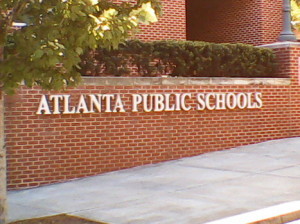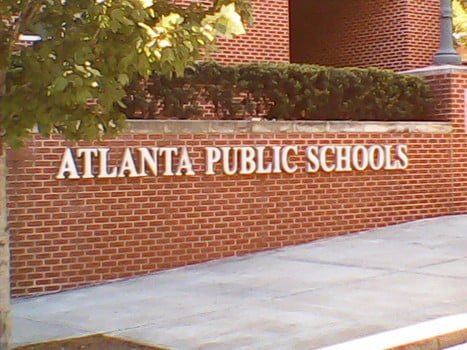 By now the headlines have screamed about how teachers and administrators cheated in Atlanta Public Schools (APS) to falsify results from the CRCT exams in elementary and middle schools. As a teacher who worked in APS for several years, these headlines literally make my stomach turn. Despite the claims about answer changing parties, administrators who regularly bullied teachers, and teachers who left all professional judgement out of the window, there’s a story that hasn’t been told. The story about teachers who KNEW something was going on, but couldn’t prove it has never been told until now.
By now the headlines have screamed about how teachers and administrators cheated in Atlanta Public Schools (APS) to falsify results from the CRCT exams in elementary and middle schools. As a teacher who worked in APS for several years, these headlines literally make my stomach turn. Despite the claims about answer changing parties, administrators who regularly bullied teachers, and teachers who left all professional judgement out of the window, there’s a story that hasn’t been told. The story about teachers who KNEW something was going on, but couldn’t prove it has never been told until now.
I started working in Atlanta Public Schools in 2007 after leaving Detroit Public Schools. During my interviews at the job fairs, I was impressed with all the progress Beverly Hall, then Superintendent of Atlanta Public Schools, touted and how it looked as if the students with the most needs were being challenged. I wanted to work in a district where despite socioeconomic status and parent involvement, children were succeeding. I was hired as a Secondary Mathematics teacher at a Title 1 high school on the Westside of Atlanta. The kids were similar to the ones in Detroit: many came from not only broken homes, but lived in the midst of heavy drug use, gang violence, and just an attitude of hopelessness due to what they saw a daily basis. Despite the students’ sense of hopelessness, I figured that with the “advancements” that APS touted we could surely bring these kids up to proficient at the end of the year.
Before school started, my Instructional Coach sat down with me to review the incoming 9th grader CRCT scores. I was surprised that 80-95% of my new students had passed their middle school (specifically 8th grade Reading, Math and Languge Arts) CRCT exams. I was told to make sure I used data in my planning, and that I assessed and retaught the material students had trouble with to make sure my scores were just as good in the Spring. I planned lessons and made sure that my instruction would reach every student. Over the next couple of days during Teacher Inservice, all teachers in the district were invited to the Georgia Dome to celebrate all of the schools who made A.Y.P (or Adaquetly Yearly Progress). I knew that the Georgia Dome was huge, so imagine my surprise when ONLY the schools who made A.Y.P. were allowed to sit on the floor of the stadium. All other schools had to sit in the regular seating and watch these “superior schools” be celebrated for their accomplishments. I was even more shocked to see that 100% of ALL the elementary schools made AYP and roughly about 80% of the middle schools. These schools celebrated with banner, balloons, chants and in the end a speech made by Dr. Hall touting their hard work and rewarding the school with monetary incentives.
As I looked around the stadium at the schools that didn’t get this great honor, there seemed to be a smirk on everyone’s face. I asked the co-worker next to me why there weren’t any high schools on the floor, she turned to me and said, “Just wait and you’ll see.” Less than a week later, I would start to understand.
The following Monday school started and, like most teachers, I began with diagnostics and the fundamentals of the class. About three days into the first week, I started to grade my diagnostics and I realized that about half my class failed their diagnostic, and not by a little. Not even half the students gained mastery. I quickly looked again at their their 8th Grade CRCT scores and realized that the majority of them had passed whether it had been in Summer School or during the regular year. I quickly chalked it up to beginning of the year laziness and decided to continue to teach my first lesson.
However, instead of things becoming easier, things got harder. Students didn’t know basic math facts and still counted on their hands. Basic skills they needed to complete the first unit were non-existent, and students balked if I asked them to reason how they came to an answer. They only did well if I gave them multiple choice tests and if I helped them reason through the answers. Students kept asking me why was I making the class so hard, and many times they shut down if I asked them to do anything challenging.
Every night I got home and thought, “What the hell had I gotten myself in to?” To make matters worse, my principal was constantly on the entire staff to make sure our standardized test scores were on par with the feeder elementary and middle schools. The staff reasoned with her that the kids not only had great difficulties reading and writing proficiently, but also had a hard time with basic math facts. However, she would not hear it. It was a known fact that if the majority of your students failed the EOCT exam, you would be marked down on your evaluation and/or possibly transferred. By the end of the year, my kids made a collective 60% passing rate, but that wasn’t good enough. I was ridiculed for my lack of “teaching,” despite the fact that the students showed clear gains in diagnostics throughout the year. By the end of the year, I was done, and there was no way I was going back to that environment.
Throughout that year, my co-workers and I had always grumbled that something wasn’t “right” about all of the elementary and a majority of the middle schools making A.Y.P., but without any proof, what could we do? We simply taught and prayed for the best.
In 2008 when the Atlanta Journal Constitution broke the story about possible cheating at a host of elementary and middle schools in the district we knew they were right. There was no other way for students passing ALL of their standardized tests throughout elementary and middle school and then getting into high school and hitting an academic “brick wall.” As the case dragged on and the Georgia Bureau of Investigations got involved, we started to hear stories of gross misconduct from people who were supposed to protect the children–not pass them along without any mastery of the content. Then when the final report was released, we were just as sickened at all the misbehavior by professionals who, under Dr. Hall’s regime had been routinely celebrated–for cheating.
Many of my colleagues left the district way before the 2013 indictments of Dr. Hall and other top officials, but I know we all breathed a sigh of relief that no longer would teachers who taught their butts off be punished by a system of secrets, lies and elitism.
I made 2009 my last year with the district and decided to teach in a suburban district on the outskirts of Atlanta. My pay is a lot less, but I’m no longer responsible for making miracles, or clean up the messes of people who aren’t honest enough to admit what is the problem.
The identity and specific circumstances of this individual has been hidden to protect their privacy.







Leave a comment